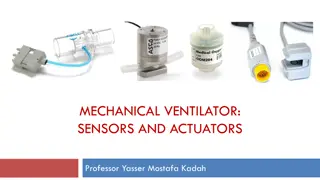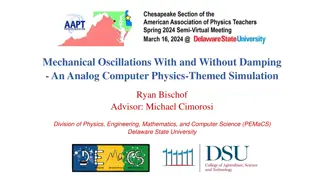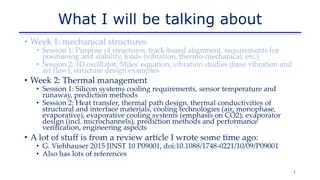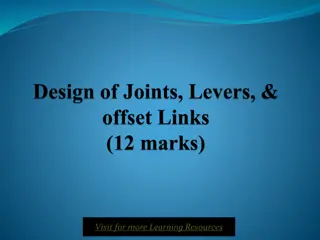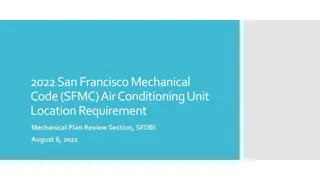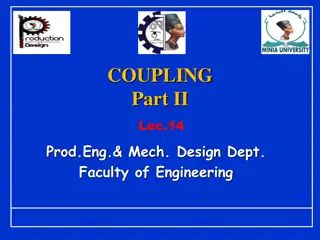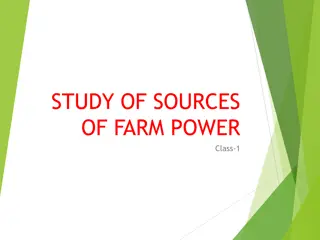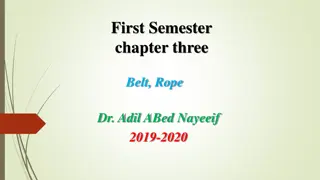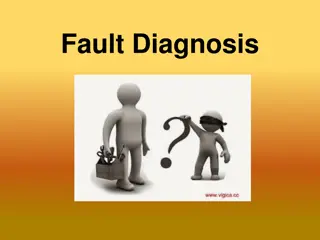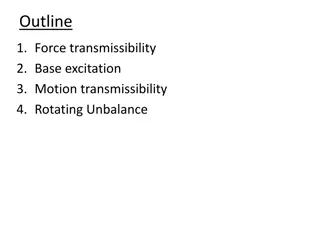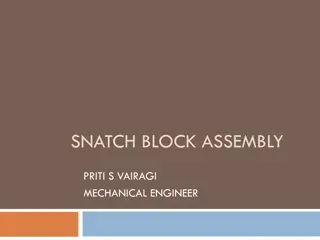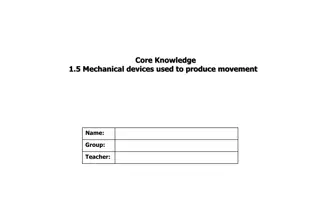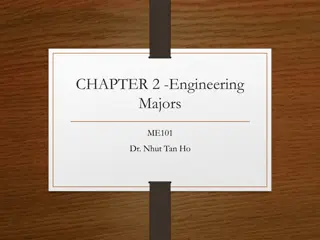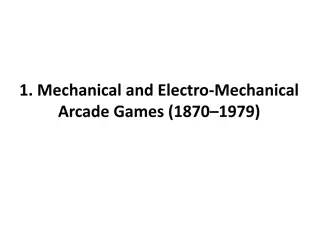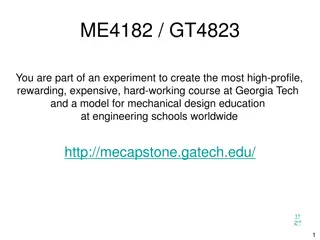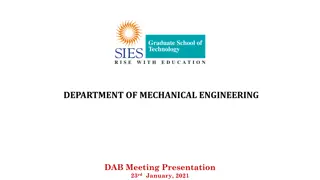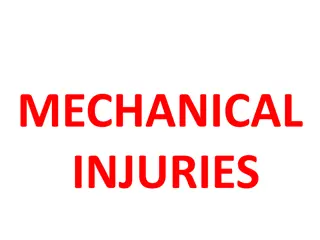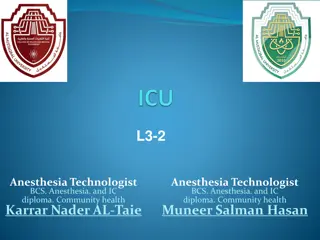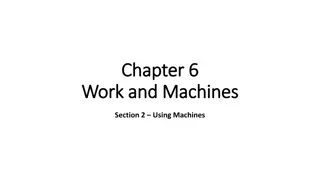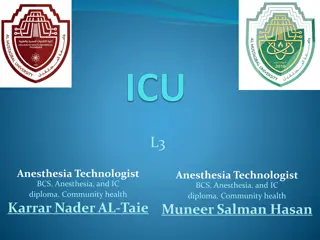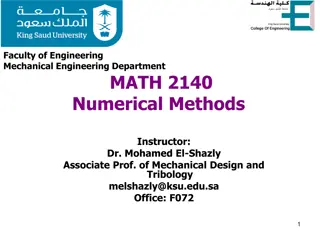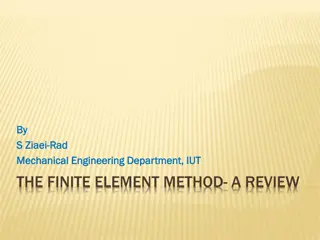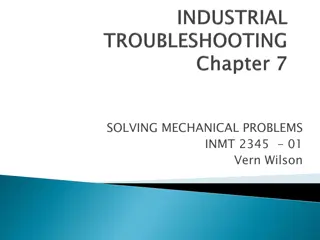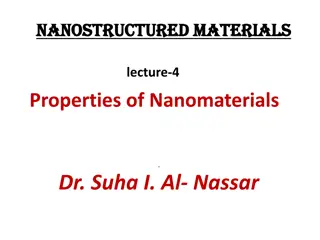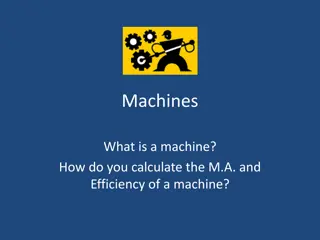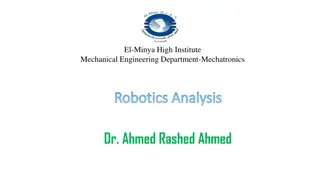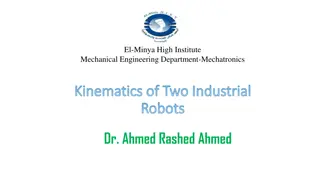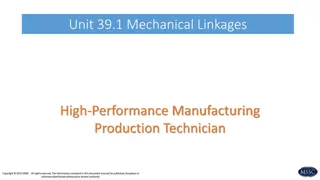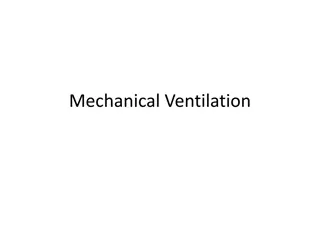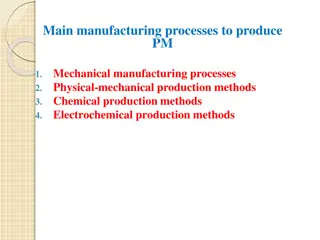Overview of Mechanical Engineering Department and Institutes
Welcome to the Department of Mechanical Engineering! This presentation provides an overview of the department, highlighting key areas such as electromobility, institutes like FAPS and FMT, and their research and teaching focuses. Explore the interdisciplinary courses, research areas, and academic of
2 views • 13 slides
Understanding Mechanical Ventilator Sensors and Actuators
Explore the essential components of mechanical ventilators, including sensors like pressure and flow sensors, actuators, and oxygen sensors. Learn about the functions and characteristics of these sensors and how they contribute to the operation of mechanical ventilators designed to assist patients w
6 views • 20 slides
Overview of Distributed Systems: Characteristics, Classification, Computation, Communication, and Fault Models
Characterizing Distributed Systems: Multiple autonomous computers with CPUs, memory, storage, and I/O paths, interconnected geographically, shared state, global invariants. Classifying Distributed Systems: Based on synchrony, communication medium, fault models like crash and Byzantine failures. Comp
9 views • 126 slides
Understanding Information Systems in Organizational Management
Management in organizations is divided into three levels: operational, tactical, and strategic. Each level requires different information systems to support various activities. Operational systems focus on routine transactions and control processes, while middle-level systems aid in semi-structured
9 views • 39 slides
Analog Computer Simulation of Mechanical Oscillations with Damping
Explore the analog computer simulation of mechanical oscillations with and without damping in a physics-themed project. Students can visualize classical physics concepts through hands-on analog circuit design, modeling spring-mass systems and RLC circuits. The project involves constructing a breadbo
0 views • 11 slides
Thermal Management and Mechanical Structures Overview
This content provides detailed information on mechanical structures and thermal management in engineering systems. Topics include the purpose of structures, alignment, stability requirements, thermal loads, vibration studies, heat transfer, cooling technologies, and the importance of effective therm
1 views • 37 slides
Piezoelectric Stack Actuator Market Analysis, Size, Share, Growth, Trends Foreca
The Global Piezoelectric Stack Actuator market stands at the forefront of technological driving advancements in various industries through its dynamic applications. These actuator systems harness the unique properties of piezoelectric materials, providing precision and versatility in a range of mech
0 views • 8 slides
Understanding Cotter Joints in Mechanical Engineering
Explore the applications, design criteria, and failure modes associated with cotter joints in mechanical systems. Learn about the design procedure, thickness determination, and various types of cotter joints. Discover how cotter joints play a crucial role in connecting components in machinery, ensur
3 views • 30 slides
San Francisco Mechanical Code 2022 - Air Conditioning Unit Location Requirements
The 2022 San Francisco Mechanical Code outlines requirements for the location of outdoor air conditioning units to address noise concerns and ensure normal use of properties. The code update reflects the shift towards more energy-efficient split heat pump systems, emphasizing a 5 feet minimum distan
0 views • 8 slides
Design of Flange Couplings in Mechanical Engineering
This detailed guide covers the design process of coupling components such as shafts, keys, bolts, and flanges for transmitting power efficiently in mechanical systems. It discusses calculations for selecting dimensions, stress considerations, types of flange couplings, and their applications in heav
1 views • 29 slides
Overview of Farm Power Sources and Utilization in Agriculture
Farm power sources in agriculture include human, animal, mechanical, and renewable energy. Human power is costly but versatile, while animal power is traditional and provides manure. Mechanical power from tractors and engines is efficient. India's farm power sources reflect a mix of traditional and
0 views • 12 slides
Understanding Belt Drives in Mechanical Systems
Belt drives are essential components in mechanical systems for transmitting power between pulleys. They are classified based on power transmission capabilities and speed. Types of belts include flat belts, V-belts, and circular belts or ropes, each suitable for different applications. Belt drives ca
0 views • 27 slides
Understanding Fault Diagnosis in Mechanical and Electrical Systems
Explore the essential methods and techniques for fault diagnosis in mechanical and electrical systems in industrial settings. Learn to identify different types of faults, utilize fault-finding aids, and rectify issues promptly to prevent future failures. Discover industry-recognized fault diagnosing
2 views • 27 slides
Introduction to Embedded Systems Design
Embedded Systems Design, Chapter 1 provides an insightful overview of embedded systems, distinguishing them from general-purpose computers. The chapter delves into the characteristics of embedded systems, their design considerations, and the various types of embedded computers such as general-purpos
1 views • 7 slides
Understanding Force Transmissibility in Mechanical Systems
Force transmissibility in mechanical systems is crucial for analyzing the relationship between applied forces and resulting vibrations. This outline covers key concepts such as base excitation, motion transmissibility, and rotating unbalance, providing insights into how forces are transmitted and am
0 views • 16 slides
Understanding Pulley Systems in Mechanical Engineering
Pulleys play a crucial role in mechanical engineering, offering fixed and movable designs that aid in changing the direction of hoisting appliances. Different types, including fixed, movable, and multiple pulley systems, provide mechanical advantage and stability in lifting loads. Utilizing multiple
1 views • 11 slides
Understanding Electric Braking Systems
Braking is the process of reducing the speed of moving or rotating equipment, such as vehicles or locomotives. This presentation by Poonam Sharma covers the classification of braking into Mechanical and Electrical categories, highlighting the advantages and disadvantages of each. It delves into type
0 views • 28 slides
Optimizing Benefits Through Sorting in LHC Magnet Systems
LHC's experience highlights the significant advantages of sorting in magnet systems, such as safeguarding against losses in mechanical and dynamic apertures, minimizing beta-beating, and enhancing field quality. By controlling observable quantities like mechanical aperture, transfer function, and fi
0 views • 8 slides
Understanding Mechanical Devices for Movement
Delve into the world of mechanical devices used to generate movement, focusing on levers as a critical mechanism for creating mechanical advantage. Learn about the different classes of levers, their applications, and how they enhance efficiency in various tools and equipment. Explore concepts such a
0 views • 8 slides
Introduction to Mechanical Engineering: Exploring Career Opportunities and Roles
This content delves into the world of mechanical engineering, covering topics such as the characteristics of students interested in engineering, the distinction between engineers and scientists, and the functions of engineers in research. It also provides insights into the differences between engine
6 views • 41 slides
Evolution of Arcade Games: From Mechanical to Digital (1870-1977)
Explore the fascinating journey of arcade games from mechanical and electro-mechanical devices in the 19th century to the birth of digital games in the mid-20th century. Witness the transition from coin-operated amusement machines to early digital arcade games and home consoles, shaping the gaming i
0 views • 37 slides
ME 4182 & GT 4823: High-profile Mechanical Design Course at Georgia Tech
Spearheading an innovative experiment, ME 4182 & GT 4823 aim to redefine mechanical design education by fostering interdisciplinary collaboration, problem-solving skills, and real-world applications. Students engage in team-based projects to design mechanical solutions, present detailed specificatio
0 views • 36 slides
Department of Mechanical Engineering DAB Meeting Presentation Summary
The Department of Mechanical Engineering held a DAB Meeting Presentation on 23rd January, 2021. The meeting agenda included topics like approval of previous minutes of meeting, academic progress of students, online teaching activities, faculty contributions, and more. The minutes of the meeting disc
1 views • 36 slides
Understanding Mechanical Injuries: Types, Classification, and General Principles
Mechanical injuries encompass a variety of harms caused to the body, mind, reputation, or property. These injuries can be classified into medical, legal, and medico-legal categories based on factors like intentionality. The types of mechanical injuries range from blunt force trauma to thermal, chemi
0 views • 79 slides
ALSYOM: Key Player in High-Tech Industries
ALSYOM, a subsidiary of ALCEN Group, is a leading company specializing in high-technology activities across various domains including defense, security, energies, aeronautics, and more. With a strong focus on innovation and expertise in development and industrialization, ALSYOM stands out as a uniqu
0 views • 23 slides
Information Systems in Organizations: Overview and Implementation
Information systems play a crucial role in organizations, encompassing transaction processing systems, functional area information systems, and enterprise resource planning systems. This content delves into the purpose of transaction processing systems, the support provided by information systems ac
0 views • 30 slides
Understanding Mechanical Ventilation in Anesthesia Practice
Anesthesia technologists play a crucial role in managing artificial ventilation, including concepts like Invasive Positive Mechanical Ventilation (IPMV), Fraction of Inspired Oxygen (FIO2), Tidal Volume (VT), Peak Flow Rate, Respiratory Rate, Minute Volume (VE), I:E Ratio, and more. They monitor and
0 views • 27 slides
Understanding Machines: Making Work Easier and Mechanical Advantage
Machines are devices that simplify work by increasing force, decreasing force, increasing distance, or changing direction. They operate by transferring energy and work from input to output, with mechanical advantage enhancing force ratios. This summary explores the principles of machines, work done,
0 views • 10 slides
Understanding Mechanical Ventilation in Anesthesia Technology
Mechanical ventilation plays a crucial role in assisting patients with breathing difficulties by delivering oxygen and removing carbon dioxide. It involves two primary types: Negative Pressure Ventilation (NPV) and Positive Pressure Ventilation (PPV). NPV helps patients with conditions like chronic
0 views • 19 slides
Newton's Interpolating Polynomials in Mechanical Engineering
Explore Newton's interpolating polynomials in the context of Mechanical Engineering, specifically focusing on numerical methods and interpolation techniques. Dr. Mohamed El-Shazly, an Associate Professor of Mechanical Design and Tribology, guides students through the concepts and applications of New
0 views • 17 slides
An Overview of Finite Element Method in Mechanical Engineering
Finite Element Method (FEM) in mechanical engineering is a powerful numerical technique involving dividing a domain into finite elements, establishing relations between variables, and assembling elements to analyze a system. This method is fundamental for solving one-dimensional problems and approxi
0 views • 63 slides
Solving Mechanical Problems in Industrial Systems
Explore the intricacies of mechanical systems maintenance including bearings, pumps, piping, hoses, and more. Dive into the world of centrifugal, rotary, gear, reciprocal, and diaphragm mechanisms. Learn about maintaining triplex mud pumps, important checks for power sources, and common maintenance
0 views • 20 slides
Understanding Mechanical Properties of Nanostructured Materials
Nanostructured materials exhibit unique mechanical properties due to factors like grain boundary structure and dislocation movement. Reduction in grain size can enhance strength and hardness while reducing ductility. Nanomaterials may reach theoretical strength levels, significantly higher than sing
0 views • 23 slides
Understanding Embedded Systems and Cyber-Physical Systems
Embedded systems are specialized computer systems embedded within larger systems, such as control systems and car controllers. This lecture covers real-time aspects, applications of Cyber-Physical Systems (CPS), and examples like the Boeing 777/Airbus A380 cockpit. It discusses the design process of
0 views • 22 slides
Understanding Machines: Calculating Mechanical Advantage and Efficiency
In the world of machines, understanding what a machine is, how to calculate Mechanical Advantage (M.A.), and Efficiency is crucial. Machines alter force, distance, or direction to make work easier but do not multiply work. By assessing input force, distance, and work alongside output force, distance
0 views • 17 slides
Understanding Robotics: Components, Joints, and Manipulators in Mechanical Engineering
Explore the world of robotics through an in-depth analysis of the key components, mechanical elements, manipulator joints, end-effectors, and types of robots used in production engineering and mechanical design departments. Learn about joints, links, degrees of freedom, and how robot manipulators ar
0 views • 22 slides
Robotics and Mechanical Design at Minia University
Explore the world of robotics and mechanical design at Minia University's Production Engineering and Mechanical Design Department. From the Kinematics of Two Industrial Robots to the renowned PUMA 560, immerse yourself in cutting-edge technology and innovative research led by experts like Dr. Ahmed
0 views • 13 slides
Understanding Mechanical Linkages in High-Performance Manufacturing
Explore the world of mechanical linkages, including the effects of friction on machine operation, operation of machine linkages, and the roles of cams and turnbuckles. Friction is discussed as a force affecting everyday tasks, while cams and camshafts are highlighted for their role in sewing machine
0 views • 8 slides
Understanding Mechanical Ventilation in COPD Exacerbation
In a case of a 64-year-old woman with COPD exacerbation, managing respiratory distress is crucial. Initiating systemic corticosteroids, doxycycline, and nebulizers while closely monitoring the patient is important. However, in cases where non-invasive ventilation is ineffective, the patient may requ
0 views • 22 slides
Main Manufacturing Processes to Produce PM - Mechanical, Chemical, Electrochemical
The process of producing PM involves various manufacturing processes such as mechanical grinding and milling, physical-mechanical production methods, chemical production methods, and electrochemical production methods. Mechanical processes include grinding and milling using jaw crushers, hammer grin
0 views • 12 slides

